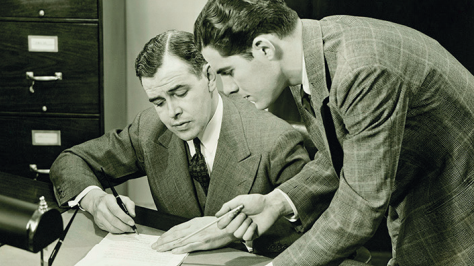December 2020
Research has found that junior accountants imitate a senior’s behaviour if they hold influence over their future promotion. Kristof Stouthuysen explains all.
Despite their thorough preliminary training, junior accountants often lack the knowledge and experience required to apply the law and auditing standards correctly in practice. That is why they are supervised during audit assignments by an experienced senior who gives them coaching. What role does imitation play in the relationship between the junior and senior accountant?
Through research, we aimed to investigate the impact imitation plays in the relationship between junior and senior accountants during auditing assignments on audit quality. We found that junior accountants are much more likely to imitate the behaviour of a senior accountant if they think that they have an influence on their likelihood of future promotion. However, our findings also demonstrate that junior accountants will not simply imitate any senior accountant: it also depends on how the junior perceives the senior’s working style.
I conducted this research alongside colleagues from Tilburg University, Rotterdam School of Management and KU Leuven, with support from Professor Olof Bik, managing director and scientific board member of the Foundation for Auditing Research.
As part of the study, we observed 138 junior accountants working for the Big 4 accountancy firms – Deloitte, PwC, Ernst & Young, and KPMG – while on their audit assignments. During our observation, junior accountants had the task of valuing a business unit using a senior auditor’s previous working documents for the valuation of a similar business unit for the same company.
The senior’s working style was reflected in the working documents, so junior accountants could use these to generate a perception of how their senior worked. Some documents showed a senior accountant to have high diligence, and a professional and critical working style, while some documents reflected the opposite.
The working documents also included a character sketch of the senior accountant and information about the influence of his or her opinion on the junior accountant’s future promotion.
We found that juniors would imitate a senior if he or she has a decisive influence on their likelihood of future promotion.
However, a senior’s working style made a difference on whether they were imitated. Juniors were more inclined to imitate a senior if the latter has a professional and critical working style, they did not imitate their senior’s behaviour if they perceived them to be less professional and less critical in their work, even if they had an influence on their promotions.
Furthermore, it was not enough for junior’s to simply copy the working documents of a professional senior. For a successful audit, they must also have their own knowledge and professional, critical working style.
This research clearly indicates that junior accountants follow the good behaviour of their seniors, even more so when they believe them to have an impact on their future promotions. It is encouraging and reassuring that they appear to not imitate their senior’s when they have a poor working style, even if they do have an impact on their likelihood of promotion.
This tendency for juniors to only imitate seniors when thought to have a professional working style is a positive sign, as it suggests they have a healthy dose of professional scepticism, and demonstrate their own professional and critical attitude. It also proposes a sense of integrity amongst the junior accountants when it comes to their work.
These findings also indicate that, while accounting practice is bound by standards and rules, the quality of the audit is also determined by very human factors such as social interaction. Senior accountants and managing partners need to be aware that they play an exemplary role in the training of juniors. If a partner doesn’t have the courage to ask a client questions, you can’t expect a junior to do so.
The results of the study have important implications for junior and senior accountants as they demonstrate the significant role that senior accountants play in the coaching of juniors and ensuring the next generation of accountants have high diligence, professional attitude, and critical working style.
Therefore, seniors assigned to a mentoring role should not only exhibit high levels of diligence but should also provide sufficient training by proactively helping juniors in understanding various audit procedures and techniques and encouraging critical thinking.
In a follow-up to this study, we will be looking at ‘groupthink’ in accounting, and whether this stops colleagues from reporting mistakes or errors. We hope to use research into this area to gain insights into the extent to which imitation and herd behaviour takes place and their effect on the quality of the audit.
• Kristof Stouthuysen is Professor of Management Accounting at Vlerick Business School and KU Leuven.




